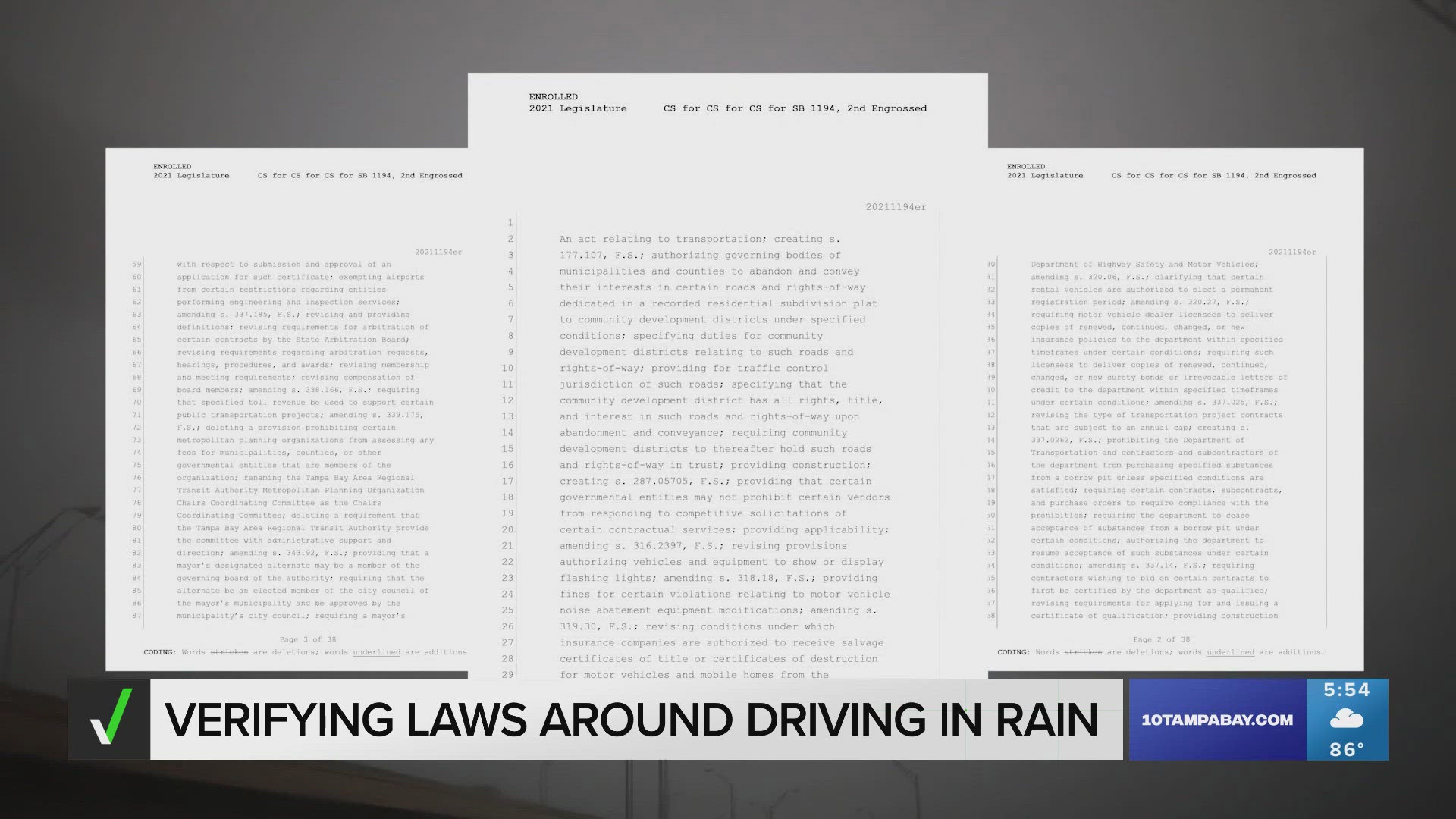ST. PETERSBURG, Fla. —
Driving on a Florida highway in the rain is often frustrating – and for many drivers seasoned in the state, it’s probably led to a couple of close calls and white knuckles.
With Florida’s growing population, more drivers hit the road coming from states where the rules differ. That means more accidents, which means higher car insurance costs for everyone in the state.
As of September 2024, full coverage car insurance in Florida costs about 48 percent more than the national average, according to Bankrate.
When the roads are slick and the rain pours, some people decide to drive with their hazard lights on thinking it helps other drivers see their car. Others don’t put their headlights on at all.
But what does the law say? Several VERIFY viewers wanted to clear up any confusion.
THE SOURCES
THE QUESTION
Is it illegal in Florida to drive with hazard lights on in the rain?
Is it legal to keep car headlights off when driving in the rain?
THE ANSWER
No. In Florida, people can legally drive with hazard lights during extreme weather conditions.
No. It’s illegal to not have headlights on when driving in the rain in Florida.
WHAT WE FOUND
Driving with hazards in the rain?
Floridians who have lived in the state for a long time may be under the impression that it is illegal to drive with hazard lights on, and that’s understandable because it was illegal up until a few years ago.
In 2021, state lawmakers passed a 38-page transportation bill that included numerous measures and revisions to then-current traffic laws. One of those changes was to a section of statutes on when using your hazards is not allowed.
“Flashing lights are prohibited on vehicles except...[d]uring periods of extremely low visibility on roadways with a posted speed limit of 55 miles per hour or higher,” the law reads.
In other words, if the weather is so bad that you’re having trouble seeing what’s in front of your car and around it, you are legally allowed to turn on those hazards. That includes when fog or smoke affects visibility.
As for the speed limit of at least 55 miles per hour, most highways and state roads in Florida fall under that category.
But even though it’s legal, experts say it’s not always the safest option.
“Just because you can drive with your hazard lights on, doesn’t mean you should,” AAA Spokesperson Mark Jenkins told 10 Tampa Bay. “Especially if you’re driving in the rain, hazard lights can be confusing and distracting to other drivers around you.”
Sergeant Steve Gaskins with the Florida Highway Patrol said hazard lights "typically override your turn signals," which could throw off surrounding drivers.
Jenkins also said that because hazards are usually turned on when a vehicle breaks down or is having issues, it can cause the drivers around you to make “unnecessary evasive maneuvers to get around you.”
With Florida’s “move over” law having just been expanded at the beginning of 2024, drivers are now required to avoid the outer lane when any sort of car is stopped on the side of the road with its hazards on.
The only time hazard lights were allowed to be on before the law changed in 2021 was for funeral processions and disabled cars.
Driving with headlights off in the rain?
Florida law clearly spells out when drivers are required to turn on their headlights.
State statute simply states that headlights are required “[d]uring any rain, smoke, or fog.”
The law’s language doesn’t mention criteria for how bad the rain, smoke or fog must be before those headlights must come on, so we can VERIFY that any presence of rain, smoke or fog requires drivers to turn on their headlights.

